Thursday 17th March 2022
I want to start this article by affirming: it’s not you.
Trying to work out what can go in the recycling bin, what needs to go to landfill (gulp), and what in the world to do with compostable/biodegradable packaging is a rubbish dilemma we all face daily.
And, I know, more than most. I spent a long time trying to resolve it as my journalism career took me on crack-of-dawn rides with bin men across London and to the heart of recycling facilities.
I was operating on the assumption it was a dilemma that could be solved – all we needed was the right information and we could create a one-stop guide of what goes in what bin. Simple!
I failed spectacularly to do this.
But I’m not the only one. We’re all failing spectacularly to deal with our rubbish.
Total waste from households increased to 22.6 million tonnes in 2020 from 22.1 million tonnes in 2019, according to the latest government statistics. Alongside this, the total amount of recycled waste from households decreased. (Don’t be too downhearted – the good news is, it was only by 1.2%). [1]
But, the problem wasn’t me. And I repeat, it’s not you. It’s the system.
The question isn’t just about what we as consumers need to do with our rubbish and recycling. It’s bigger than that. It’s about how we restructure the waste and recycling system.
That’s exactly what Joe Bower, Yeo Valley’s Packaging Procurement Manager, spends his days working on. So, we wanted to find out more and ask if he could provide us with some clarification…

Hi Joe. Nice to meet you. First up, can you tell us a little about you…
“Hello, sure. I’m one of the packaging geeks at Yeo Valley and I love it! Sustainability is close to my heart, so I’m proud to be working for a company that recognises the severity of the environmental crisis and the challenges we’re facing, but also actively invests in genuine sustainable solutions to tackle them.
“I’ve learnt so much in my role. Like most people, at the start of my career, I had no idea what the different kinds of plastic were or the various properties they had. I was operating under the false assumption that rigid plastic was recyclable and flexible plastic wasn’t. But, it’s so much more complex than that. So, as it turns out, I had unknowingly been putting non-recyclable plastic into the recycling bin for ages.”
Hopefully you can help ensure we don’t make the same mistakes. To set the scene, is plastic intrinsically bad?
“There’s quite a few sides to that question!
“In terms of carbon footprint, plastic is actually one of the most sustainable food packaging materials, because it’s so light and it has really good recyclability. It also keeps products fresh for longer and gets products to peoples’ homes intact, which is really important when it comes to reducing food waste.
“The issue we have with plastic is that too much of it is escaping into the environment which is unacceptable. But, that’s a problem with the waste stream rather than the material itself.
“We need to reduce the amount of plastic we use. We need to recycle plastic properly. But, in terms of eliminating plastic entirely, I’d say that’s not always the right choice.”
So, at Yeo Valley Organic you’re sticking with plastic yogurt pots?
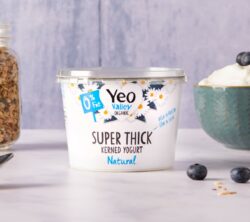
“Yes. Our customers ask: “Why don’t you switch to glass?” or “Why aren’t you using aluminium?” and they’re valid questions considering the headlines in the media and the misinformation online.
“It would be an easy marketing win to switch to glass. But, that decision would be made on sentiment rather than robust data and analysis. And it would end up doing more harm than good.
“For example glass milk bottles, in comparison, generate a much higher carbon footprint because a lot of energy heat is required to blow glass. The same can be said for recycling glass, too. Plus, glass is heavy and glass milk bottles don’t nest inside each other has to be shipped in it’s blown form so shipping around glass milk bottles is less carbon-efficient. Glass bottles have the benefit of being reusable and they tend to last about 18 uses on average [2], which spreads the carbon footprint.
“However, plastic has a dramatically lower carbon footprint than glass and aluminium – as long as it’s treated properly at the end of life. Recycled plastic has a lower carbon footprint still. That’s why we’re sticking to plastic pots.
“After a year-and-a-half of trials, we’ve managed to implement 100% recycled plastic for the majority of our range. We also wrap our yogurt pots with 100% recycled card. Plus, they have very clear recycling instructions.
“But, no matter how good the material is, we are firm believers that less packaging is always better. Our default motto is “Remove, Reduce, Reuse, Recycle”. Reduce where you can by removing all unnecessary packaging. If you can’t remove it, then look to reuse it. And if you can’t reuse it, recycle it. If you can’t remove it, then look to reduce it. If you can’t reduce it, look to make it reusable. And if you can’t reuse it, make it recyclable and add in recycled content.
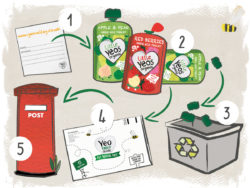
“At Yeo Valley Organic we’re strict in assessing what parts of our packaging are unnecessary. For example, we’re going to trial taking the lids off yogurt pots. If successful, that will remove 40 million lids and 120 tonnes of material, reducing CO2e by 742 tonnes – which is huge.
“But, we have to be cautious, because we don’t want to negatively impact food waste (remember that’s the majority of a product’s carbon footprint). It’s important that we take this holistic view when assessing our packaging’s sustainability.”
Who knew so much thought went into a yogurt pot! That’s a really powerful insight into how complex the problem is… are customers generally understanding of decisions you make?
“Our customers trust us to do the right thing. We try to regularly consult with them and keep open communication. We’re transparent about our decisions, but we can’t solve the waste and recycling issue alone – it requires everyone in the food industry, the Government and local authorities to work together.”
So that we can still be part of the solution in the meantime, can you give us any recycling tips?
One tip I would give is to look for the OPRL labels when trying to determine if something is recyclable. It’s a scheme that aims to deliver a simple, consistent and UK-wide recycling message for packaging – whatever the sector.
Another key tip would be to wash and dry your recycling. Food waste is a massive contaminant and therefore a big recycling issue. So if you’ve got a yogurt pot, rinse it out for two seconds before you put it in the recycling bin, and that will really help.
Interview and article by Lizzie Rivera and Francesca Carpani from ethical lifestyle hub Live Frankly.
Have a read of the different ways we’re reducing the impact of our packaging:
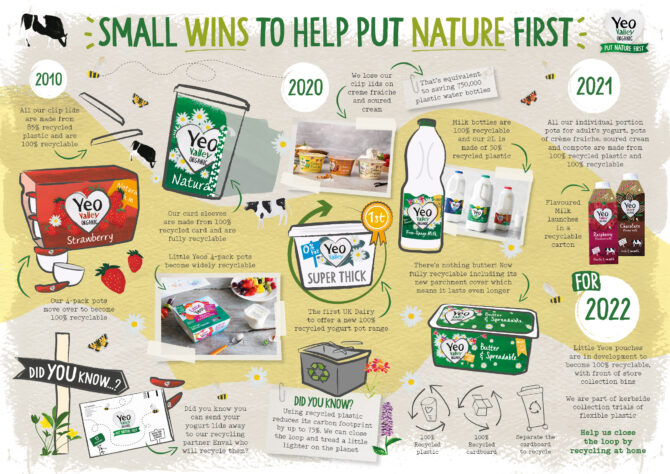
References:
[1] https://www.gov.uk/government/publications/progress-report-on-recycling-and-recovery-targets-for-england-2020/progress-report-on-recycling-and-recovery-targets-for-england-2020
[2] https://www.bbc.co.uk/news/business-43724314


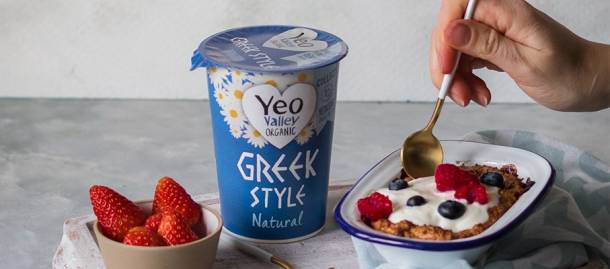
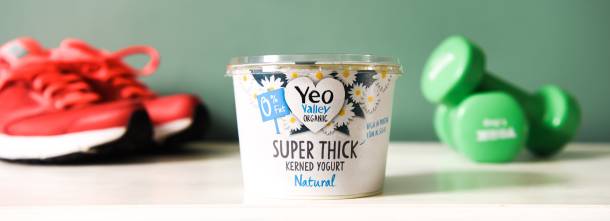
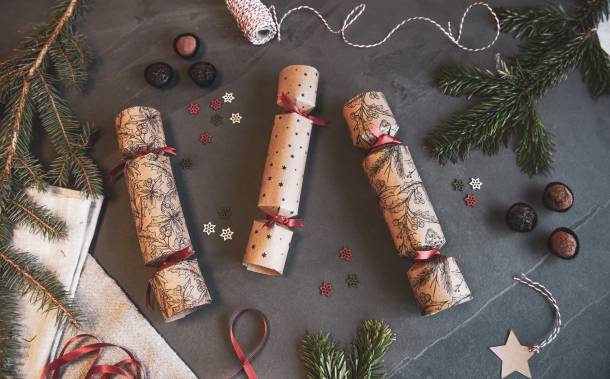
Thank you for the information. very interesting.
Not to do with yoghurt pots but I’ve recently discovered that our local Tesco collect and recycle plastic packaging such as fruit bags, bread wrappers etc. this is saving an immense amount of plastic going to landfill..
We pop all our plastic in the dishwasher top shelf
No wast of water as it’s being washed with the normal washing up
In North Somerset we have fairly good recycling
But a lot of people are just to lazy to sort there wast out
Perhaps would be an good idea to use our points to buy re-usable lids.
I think it’s wonderful that you are serious about recycling and are keeping your customers up to date with all the information. Love the idea of a reusable lid for the yogurts, so simple and makes sense. If only all local councils could have the same recycling policies it would make life much easier. Perhaps the Government could bring in legislation if the councils won’t do it willingly.
Finally, an influencer returning to the old adage – Refuse, Reduce, Reuse, Recycle. For too long, recycling has been the only solution peddled by the politicians and the greenies. As Joe says, it’s so very much more complicated than that.
I always wash pots & bottles before recycling. we have a separate recycling bins for plastic and papers. It’s sad to see some people putting all mixed up with food. We need to make more awareness. Thank you YeoValley and keep up the good work.
A very helpful article.
A reusable lid, either purchased or with yeokens would be brilliant. I have a stock of lids which I kept but they split eventually.
I do appreciate the effort going in to making your containers easier to recycle and using recycled plastic. We always wash out pots before recycling and there’s one thing I’ve noticed with having just the sealed lid ( and this applies to the larger – more than one portion pots) – the yogurt tends to dry round the top of the pot which means it’s takes longer to wash/rinse.
I like the idea of producing a reusable lid – similar to those sold in ikea – (which are too big for yoghurt pots) – made of silicon.
Great article, thank you. Battling with the recycling system can be so frustrating as there are so many items which don’t tell you what the product is made of. Just saying things like ‘recyclable’, ‘compostable’, ‘widely recycled’, ‘not yet recycled’, or worse, ‘don’t recycle’, doesn’t help with working out which bin to put the item in. Thank you for reassuring us that it’s not us who are the problem!
All very useful information. I searched to see how to recycle yoghurt lids. There is so much contradiction on google search. Many answers say pots aren’t recyclable. We know this but many don’t. All these answers should be taken out or amended as every council is different. Ours seems to recycle lots of things but we have to take their word for it. I put nothing in the recycling bin until clean, It takes very little time to do this but we all have to care.